Diplomatic Bluebook 2020
Chapter 2
Japan's Foreign Policy that Takes a Panoramic Perspective of the World Map
2 Situation in Middle East Region
(1) Iran
Iran is a major Shiite regional power with land of approximately 4.4 times the size of Japan with a population of about 82 million and is blessed with abundant natural resources. 2019 saw mounting tensions in the Middle East, including concerns over the Iranian nuclear issue.
Regarding the Iranian nuclear issue, the U.S. withdrew from the Iran nuclear deal (Joint Comprehensive Plan of Action (JCPOA)) in May of 2018, and then in May 2019, started an embargo of Iranian crude oil by not extending exemptions on sanctions exceptionally granted to eight countries and regions, including Japan. In the same month, Iranian President Rouhani declared that Iran was not able to obtain the profits in the oil and financial sectors that would have been obtained by the nuclear deal, and stated that Iran would remain in the nuclear deal but that Iran would partially suspend fulfillment of its obligations if the situation did not improve. Following this, since July, Iran has gradually taken steps in five stages to suspend its obligations under the nuclear deal, such as exceeding the upper limit on low enriched uranium storage (300 kg) and exceeding the upper limit on uranium enrichment (3.67%) specified by the nuclear deal.
Additionally, there were several instances where local tensions increased. In June two ships were attacked, including a Japan-related vessel, and a U.S. drone was shot down by Iran. In September the U.S. condemned the attack on Saudi Arabia's oil facilities as an attack by Iran, and the UK, France, and Germany also issued a statement blaming Iran, but Iran denied its responsibility.
Amidst this situation, Japan continues persistent diplomatic efforts to alleviate tensions and stabilize the situation in the Middle East, leveraging its position as an ally with the U.S., and, at the same time, its positive and long-standing relationship with Iran.
Prime Minister Abe visited Iran in June and met with Supreme Leader Ayatollah Seyed Ali Khamenei and President Rouhani. It was the first visit to Iran by a Japanese Prime Minister in 41 years. There were positive comments toward easing tensions from the two Iranian leaders. For example, President Rouhani stated that Iran did not want a war with the U.S. and would not pursue possession of nuclear weapons, and Supreme Leader Khamenei stated that Iran bans the production, possession and use of nuclear weapons and that it opposes them.
In August, Iranian Foreign Minister Zarif visited Japan, paid a courtesy call to Prime Minister Abe, and held a Foreign Ministers' Meeting. Japan once again called for Iran to refrain from further measures that undermine the nuclear deal in addition to urging them to relieve tensions.
At the UN General Assembly in September, Japan held summit meetings and foreign ministers' meetings with Iran and with the U.S. respectively. At the summit meeting with Iran, Prime Minister Abe, in addition to showing strong concern over the worsening situation in the Middle East, stated to President Rouhani that Iran should play a constructive role toward regional peace and stability. He also expressed concern over suspending implementation of the nuclear deal and requested that Iran fulfill its responsibility as a coastal state to ensure the safety of navigation of vessels. The leaders and foreign ministers of the U.S. and Japan agreed to continue cooperation to ease tensions and stabilize the situation in the Middle East.
In November, Iranian Vice-President for Legal Affairs Joneydi visited Japan on the occasion of the Ceremony of the Enthronement of His Majesty the Emperor and paid a courtesy call to Prime Minister Abe.
In December, President Rouhani visited Japan in return for Prime Minister Abe's visit to Iran in June, which was the first visit to Japan by an Iranian President in 19 years, and had a summit meeting with Prime Minister Abe. While Prime Minister Abe called for Iran to play a constructive role for the regional peace and stability, President Rouhani stated that Iran also hopes for regional peace and stability and that Iran intends to continue close cooperation with Japan. In addition, when Prime Minister Abe explained that Japan was considering utilization of SDF assets to strengthen its information gathering posture, President Rouhani said that Iran appreciates Japan's diplomatic efforts to ease regional tensions and understands Japan's intention to contribute to ensuring safety of navigation through its own initiatives, and, in addition, that Iran appreciates Japan's transparency in explaining this initiative.
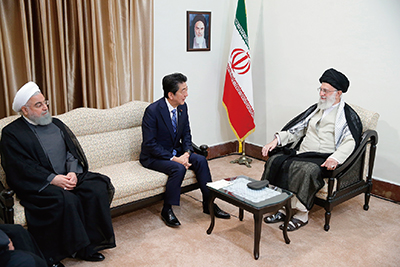 Meeting between Prime Minister Abe and Supreme Leader Khamenei (June 13, Tehran, Iran; Photo: Cabinet Public Relations Office)
Meeting between Prime Minister Abe and Supreme Leader Khamenei (June 13, Tehran, Iran; Photo: Cabinet Public Relations Office)January 2020 saw the killing of Major General Qasem Soleimani, Commander of the Islamic Revolutionary Guard Corps-Quds Force by the U.S. and Iranian attack on U.S. military bases in Iraq. The tensions remain high in the Middle East.
2019 was the 90th anniversary of the establishment of diplomatic relations between Japan and Iran. Among a variety of related events, in August, Parliamentary Vice-Minister for Foreign Affairs Yamada Kenji visited Iran and attended a ceremony to commemorate the 90th anniversary of the establishment of diplomatic relations between Japan and Iran (see the Column on page 144).
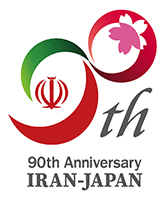 Logo for the 90th anniversary of the establishment of the diplomatic relationship between Japan and Iran
Logo for the 90th anniversary of the establishment of the diplomatic relationship between Japan and Iran2019 marked the 90th anniversary of the establishment of the diplomatic relationship between Japan and Iran. Japan and Iran have been engaged in exchanges through the Silk Road since more than 1,000 years ago. For example, Shosoin of Horyu-ji Temple in Nara Prefecture holds Persian crafts that are believed to have come through the Silk Road. Official diplomatic relations were established in 1929 between the Government of Japan and Persia, which is present-day Iran.
In 2019, there were frequent reciprocal visits by key officials, including Prime Minister Abe's visit to Iran in June and President Rouhani's visit to Japan in December. The two countries also held various anniversary events throughout the year, during which they reaffirmed their traditional friendly relations.
In January, the 90th anniversary kicked off with a reception at the Embassy of Japan in Iran, including a book donation ceremony and a Japanese drum (wadaiko) concert.
In May, under the sponsorship of the Tokai-Iran Friendship Association, two Iranian ceramic artists were invited to Gifu Prefecture to participate in a seminar on the technique of lusterware, a form of ceramic art that had been lost in Iran but was revived in Japan. The aim of this seminar was to bring this technique back to Iran. The pieces produced in this seminar are to become permanent exhibits at the Reza Abbasi Museum in Tehran. In October, a donation ceremony for these works was held there.
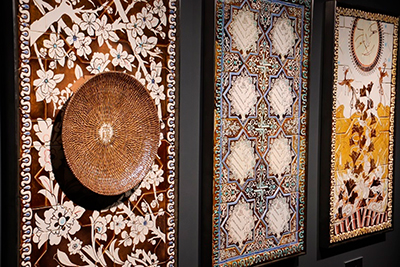 Three lusterware ceramic works donated to the Reza Abbasi Museum
Three lusterware ceramic works donated to the Reza Abbasi MuseumA commemorative event was held in August. In this event, projection mapping movies representing the friendly relations between Japan and Iran were screened at Golestan Palace, the site where Japan's first Minister Extraordinary and Plenipotentiary to Iran, Kasama Akio, presented his credentials approximately 90 years ago. Mr. Yamada Kenji, Parliamentary Vice-Minister for Foreign Affairs, attended the event while Mr. Telebian, Deputy Minister of Cultural Heritage, Handicrafts and Tourism Organization represented Iran at the event. Coinciding with this event, lectures and workshops on the technology and expression of projection mapping were conducted by Japanese experts for university students majoring in architecture and art at Shiraz University as well as universities in Tehran.
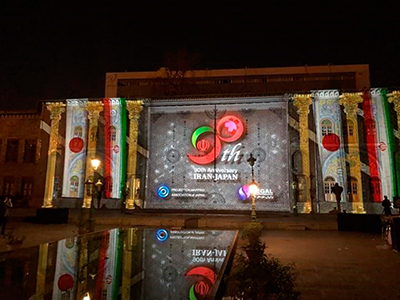 Projection mapping event at Golestan Palace
Projection mapping event at Golestan PalaceIn addition, a number of commemorative events were held, based on applications from individuals and private sector organizations. Through the 90th anniversary commemorative events, which represent Japan and Iran's rich history and culture, the public and private sectors of both countries came together to celebrate the anniversary and looked back on their 90-year history.
(2) The Gulf States and Yemen
The Gulf States1 are important partners for Japan from the perspective of Japan's energy security. In recent years, the Gulf States have been working toward social and economic reforms, prioritizing issues such as industry diversification, human resources development and departure from dependence on oil, and Japan has been cooperating and supporting the realization of these reforms in order to contribute to the long-term stability and prosperity of the Middle East. These efforts include cooperation based on the “Japan-Saudi Vision 2030,” which was formulated by Japan and Saudi Arabia as a compass for bilateral cooperation modeled after the “Saudi Vision 2030,” Saudi Arabia's initiative for industry diversification and departure from dependence on oil, and on the “Comprehensive Strategic Partnership Initiative” between Japan and the United Arab Emirates. Ministerial meetings regarding the “Saudi-Japan Vision 2030” were held in June and October to confirm progress on cooperation and to exchange opinions on policies for future cooperation (see the Column on page 146).
Many high-level dignitaries visited Japan in 2019, such as the visit by H.H. Sheikh Tamim bin Hamad Al-Thani, Amir of the State of Qatar to Japan (Official Visit) in January, the visit by H.R.H. Prince Mohammed bin Salman bin Abdulaziz Al Saud to Japan in June for the G20 Osaka Summit, and the visits by H.H. Sheikh Tamim bin Hamad Al-Thani, Amir of the State of Qatar and H.R.H. Prince Salman bin Hamad Al Khalifa, Crown Prince of the Kingdom of Bahrain in October on the occasion of the Ceremony of the Enthronement of His Majesty the Emperor.
From Japan, Foreign Minister Kono visited Saudi Arabia in April. Prime Minister Abe, amidst rising tensions in the Middle East, visited Saudi Arabia, the United Arab Emirates, and Oman in January 2020, and the countries shared the view that all parties should exercise self-restraint and make every possible diplomatic effort to prevent further deterioration of the situation. In addition, Prime Minister Abe explained to the leaders of the countries the information gathering activities by the Self-Defense Forces for the purpose of ensuring the safety of navigation of Japan-related vessels in the Middle East and gained their support and understanding. Furthermore, the strengthening of bilateral relations was also confirmed.
In Yemen, the Houthis have continued to fight against the Yemeni Government and the Arab Coalition despite the Stockholm Agreement2 that was signed between the Yemeni Government and the Houthis in December 2018. However, some improvements have been seen, such as a reduction of cross-border attacks by the Houthis into Saudi Arabia and the release of some prisoners of war between the Arab Coalition and the Houthis in November. In August, there were temporary clashes between the Yemeni Government and the South Transitional Council (STC, which asserts the separation and independence of southern Yemen), and in November the “Riyadh Agreement,” which includes the establishment of a new government by the Yemeni Government and the STC, was signed with the intermediation of Saudi Arabia and others. The severe humanitarian situation in Yemen has continued due to the impact of the prolonged conflict, and from January 2015 to December 2019 Japan provided support of more than 250 million US dollars in total to Yemen through cooperation with UN agencies and others, and Japan will continue to provide support for the stabilization of Yemen.
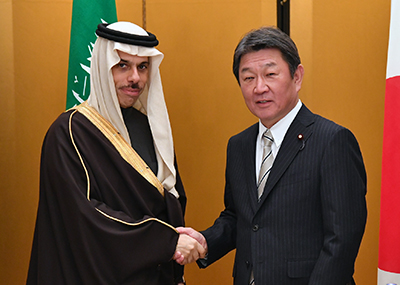 Japan-Saudi Arabia Foreign Ministers' Meeting
Japan-Saudi Arabia Foreign Ministers' Meeting (November 22, Nagoya, Aichi)
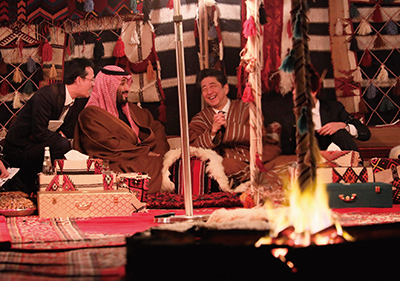 Meeting between Prime Minister Abe and Crown Prince Mohammed bin Salman of Saudi Arabia (January 12, Ulah, Saudi Arabia; Photo: Cabinet Public Relations Office)
Meeting between Prime Minister Abe and Crown Prince Mohammed bin Salman of Saudi Arabia (January 12, Ulah, Saudi Arabia; Photo: Cabinet Public Relations Office)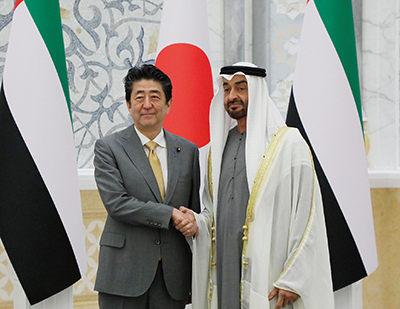 Meeting between Prime Minister Abe and Crown Prince Mohamed bin Zayed Al Nahyan of Abu Dhabi (January 13, United Arab Emirates; Photo: Cabinet Public Relations Office)
Meeting between Prime Minister Abe and Crown Prince Mohamed bin Zayed Al Nahyan of Abu Dhabi (January 13, United Arab Emirates; Photo: Cabinet Public Relations Office)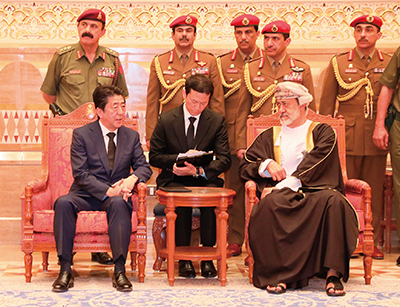 Prime Minister Abe conveying condolences to and conversing with Sultan Haitham bin Tariq bin Taimur Al Said of Oman (January 14, Muscat, Oman; Photo: Cabinet Public Relations Office)
Prime Minister Abe conveying condolences to and conversing with Sultan Haitham bin Tariq bin Taimur Al Said of Oman (January 14, Muscat, Oman; Photo: Cabinet Public Relations Office)- 1 Saudi Arabia, the United Arab Emirates, Oman, Qatar, Kuwait, and Bahrain
- 2 Under UN mediation and at a conference between the disputing parties held in Sweden, both sides agreed to a ceasefire in Hudaydah, withdrawal from the city and port, and exchange of detainees, etc.
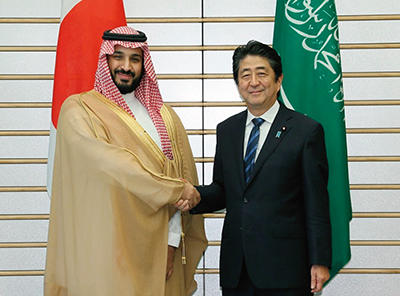 H.R.H. Prince Mohammed bin Salman bin Abdulaziz Al Saud and Prime Minister Abe in agreement to launch the Joint Group for “The Japan-Saudi Vision 2030” (September 1, 2016, Tokyo; Photo: Cabinet Public Relations Office)
H.R.H. Prince Mohammed bin Salman bin Abdulaziz Al Saud and Prime Minister Abe in agreement to launch the Joint Group for “The Japan-Saudi Vision 2030” (September 1, 2016, Tokyo; Photo: Cabinet Public Relations Office)Japan and Saudi Arabia have consistently maintained a good relationship since the establishment of diplomatic relations in 1955. In particular, economic cooperation, including cooperation in the petroleum industry, forms the foundation for bilateral relations; Saudi Arabia has continued to be Japan's largest crude oil supplier, while Japan has continued to be one of Saudi Arabia's largest crude oil importers. Saudi Arabia is a major energy power that boasts one of the world's largest oil deposits, greatest amount of oil production, and most oil exports. On the other hand, its greatest challenge is to reduce its dependence on oil, which contributes to about 90% of its total exports and about 80% of its fiscal revenue. Saudi Arabia is entering an era of great transformation as it seeks to break away from oil dependence and diversify its industries. Against this backdrop, it is deepening its bilateral relationship with Japan not only in the field of energy, but across a wide range of areas including politics, society, and culture. The remarkable progress achieved in their bilateral relations is materialized as “The Japan-Saudi Vision 2030.”
Saudi Arabia announced “The Saudi Vision 2030” in April 2016, with a view to realizing inclusive development through reducing dependence on oil and diversification of industries. In response, Japan took the opportunity of the visit by Custodian of the Two Holy Mosques King Salman bin Abdulaziz Al Saud to Japan in March 2017 to announce bilateral cooperation through “The Japan-Saudi Vision 2030” with the aim of cooperating with Saudi Arabia, as Japan's strategic partner, toward the realization of “The Saudi Vision 2030.” Placing emphasis on the synergistic effect between “The Saudi Vision 2030,” which is Saudi Arabia's new national strategy, and “Japan's Growth Strategy” that aims to achieve a GDP of 600 trillion yen, it advocates for the implementation of projects that will create a win-win situation for both Japan and Saudi Arabia through public-private cooperation. It establishes three pillars for cooperation between the two countries: diversity, innovation, and soft values (social and cultural values). Currently, 65 ministries and agencies from both countries have been involved, and are advancing comprehensive cooperation spanning nine fields (competitive industries, energy and environment, entertainment, healthcare and medical, agriculture and food, quality infrastructure, SMEs and capacity building, culture, sports and education, and investment and finance).
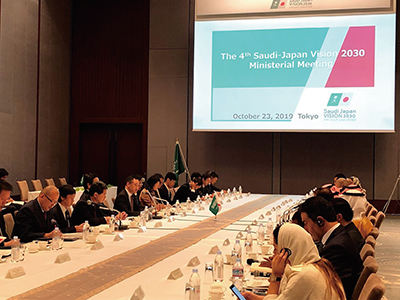 Fourth Ministerial Meeting (October 23, 2019, Tokyo)
Fourth Ministerial Meeting (October 23, 2019, Tokyo)In October 2019, the Fourth Ministerial Meeting on “The Japan-Saudi Vision 2030” convened in Tokyo to confirm the basic direction and progress of specific projects. This meeting was attended by senior officials including Minister of Economy and Planning Mohammed bin Maziad Al Tuwaijri and Minister of Commerce and Investment, Majid bin Abdullah Al Qasabi. The two countries signed “The Japan-Saudi Vision 2030 2.0 Updated” which takes into consideration progress made after the Third Ministerial Meeting held in June the same year while setting out the following as the new direction for the vision: (1) Unwavering support for Saudi Arabia's economic reform; (2) Enhancement and acceleration of cooperation that captures social change, such as entertainment and tourism; and (3) Acceleration of the materialization and realization of cooperation projects.
Under the new compass embodied by “The Japan-Saudi Vision 2030,” the relationship between Japan and Saudi Arabia, built up over many years, is moving forward with momentum day by day for the growth and prosperity of the two countries.
(3) Iraq
In Iraq, since October, one year after the establishment of the government headed by Prime Minister Abdul-Mahdi, there have been intermittent large-scale demonstrations in Baghdad and central and southern Iraq demanding radical reforms to the political system in addition to improvements to public services and measures to reduce unemployment and poverty. Prime Minister Abdul-Mahdi promised to support the people's lives and implement various reforms, but announced his resignation in December among continuing demonstrations.
With regard to security, against the backdrop of the U.S.-Iran conflict, there were multiple rocket attacks targeting Iraqi military bases and U.S. interests in Iraq, as well as drone attacks on Popular Mobilization Units (PMU) bases. The Iraqi military and security agencies continue to wipe out remnants of the “Islamic State in Iraq and the Levant (ISIL)” in northern and northwestern Iraq, although the threat has not been eradicated and sporadic terrorist activity by ISIL is still occurring in various parts of Iraq, including in Baghdad.
After the regional parliamentary elections in September 2018, arrangements for the formation of the regional government in the Kurdistan region progressed, and in June 2019 President of the Kurdistan Region Nechirvan Barzani took office, with a regional government being formed in July, headed by Masrour Barzani, Prime Minister of the Kurdish Regional Government.
Japan continues to contribute to infrastructural reconstruction in Iraq through yen-loan projects in areas such as water and electricity supply. In June an exchange letter was signed on a yen loan to improve Iraq's largest refinery, and in September renovation work on a thermal power plant near Baghdad, which was rehabilitated through a yen loan project, was completed. Furthermore, Japan continued to provide support of 63 million US dollars through international organizations as an effort to stabilize Iraq for the purpose of the early return and settlement of the refugees and internally displaced persons caused by ISIL's invasions. In September Prime Minister Abe received a courtesy call from Ms. Nadia Murad (an Iraqi recipient of the 2018 Nobel Peace Prize 2018) during the UN General Assembly, and she thanked Japan for its support of Iraq.
The 80th anniversary of the establishment of Japan-Iraq diplomatic relations was celebrated in November, and exchanges between the two countries have advanced, centering on academic and intellectual exchanges. In February, six members of the Iraqi Parliament visited Japan and attended a “Seminar to Share Japan's Experiences and Knowledge” aimed at utilizing Japan's knowledge for reconstruction and national reconciliation.
(4) Syria
A Situation
The ongoing Syrian crisis, which began in 2011 and is seeing continued military confrontation with no prospects of stabilization, has resulted in the deaths of as many as about 570,000 people as well as created more than 5.6 million refugees and approximately 5.9 million internally displaced persons. It is considered to be this century's worst humanitarian crisis.
ISIL, which had expanded its strength in Syria and Iraq since 2013, lost all of its territory in March 2019, and its decline became decisive in October when ISIL leader Abu Bakr al-Baghdadi was killed while hiding in the Idlib region of northwestern Syria. On the other hand, it has been pointed out that there are still dormant ISIL cells in hiding, waiting for opportunities to carry out terrorism. Thus the international community continues to watch that trend.
In the Idlib region, Russia and Turkey agreed (commonly known as the Sochi Agreement) in September 2018 to tension mitigation measures, centering on the establishment of a demilitarized zone. The implementation of the agreement has not progressed. In April 2019 fighting intensified, between the dissidents and the Syrian government Army, which receives support from Russia, causing a deterioration of humanitarian conditions and giving rise to more than 500,000 internally displaced persons. Amidst this, various factions within the opposition groups are also working together to defend their positions. It is expected that the situation will remain unchanged for an extended period of time.
Turkey, which has security concerns about the Kurdish forces (PKK / YPG) deployed in the northeastern regions of Syria, has eliminated terrorist organizations such as ISIL and other forces from the Syria-Turkish border area. Then Turkey launched the operation “Peace Spring” on October 9 to establish a “safe zone” in northeastern Syria in order to secure a return destination for Syrian refugees in Turkey. Following the launch of this operation, there was an occurrence of estimated 220,000 or more internally displaced persons, and the humanitarian situation became aggravated. Turkey has held discussions with the U.S. and Russia, and it appears that Turkey has achieved some of its initial operational goals, such as the partial withdrawal of Kurdish forces (PKK / YPG) and the implementation of joint patrols with Russia and others in the border areas. On the other hand, the outlook remains unclear as new issues arise, such as how Syrian refugees should return to the “safe zone,” or advances of the Syrian government troops stationed in the northeastern region, and approach between the Syrian Government and the Kurdish forces (PKK / YPG). Under these circumstances, even though the U.S. announced its withdrawal from the northeastern regions of Syria, it maintains armed forces in oil fields such as in the northeastern regions for anti-terrorism measures and other reasons.
Israel made attacks in Syria, worrying about the increasing influence of Iran and Hezbollah (a Shiite Muslim organization that campaigns against Israel) in Syria. In light of these Israeli concerns, U.S. President Trump on March 25 signed a U.S. Presidential Proclamation acknowledging the Golan Heights to be a part of Israel. In response to this, the international community reiterated its position that Israel's annexation of the Golan Heights would not be permitted, referring to UN Security Council resolution 497, etc.
B Political Process
As for the political process, Syrian dialogue has been suspended since 2018, but in September 2019 UN Secretary-General Guterres announced that the Syrian Government and dissidents had agreed to establish a constitutional committee to discuss constitutional amendments, and the opening ceremony and the committee's first meeting were held in Geneva in October. The international community welcomed the establishment of the committee, but many think that its future activities will not be easy because, prior to its establishment, there were difficult negotiations over the selection of people, management, and committee rules. The international community continues to call for progress in the political process, in line with UN Security Council resolution 2254, which calls for a political resolution to the Syrian crisis.
C The Japanese Government's Efforts
Japan has consistently maintained its position that the crisis in Syria cannot be resolved by any military means, and a political solution is indispensable. At the same time, Japan also attaches importance to providing continuous support for improving humanitarian conditions. From this standpoint, following the aggravated situation in Syria, Japan has provided total assistance worth more than 2.7 billion US dollars to Syria and neighboring countries from 2012 to the end of 2019 for humanitarian assistance.
In September Japan decided to provide approximately 12 million US dollars of new support in order to restore the pediatric hospital in the eastern Aleppo area, which was damaged by fighting, and to quickly restore community health and medical services. Furthermore, in December Japan decided to provide additional assistance of 14 million US dollars as emergency humanitarian assistance for northeastern Syria, where the humanitarian situation had deteriorated.
Japan intends to continue its efforts in close coordination with the international community to improve and stabilize the situation in Syria, with focus on humanitarian support, which is Japan's forte.
(5) Jordan and Lebanon
The situation in Jordan remains relatively stable compared to other parts of the constantly turbulent Middle East region. Jordan has, under the leadership of His Majesty King Abdullah II, played an important role in promoting the peace and stability of the region, such as with countermeasures against extremists, its acceptance of a large number of Syrian refugees, and active involvement in the Middle East Peace Process. The country's role is highly regarded by the international community.
With regard to Jordan's relations with Japan, a foreign ministerial meeting was held in Stockholm (Sweden) in June, and a summit meeting was held in New York (U.S.) in September, in the margins between international conferences. In December State Minister for Foreign Affairs Suzuki Keisuke visited Jordan. From Jordan, His Royal Highness Al Hussein bin Abdullah II, Crown Prince of Jordan, was in attendance for the Ceremony of the Enthronement of His Majesty the Emperor in October and met with Prime Minister Abe. Thus, Japan and Jordan have held active dialogues at the leader and ministerial levels and strengthened their strategic partnership. The two countries have shared the view to coordinate on bringing stability to the Middle East and to further develop the countries' bilateral relations in a wide range of areas such as diplomacy, security, and economics.
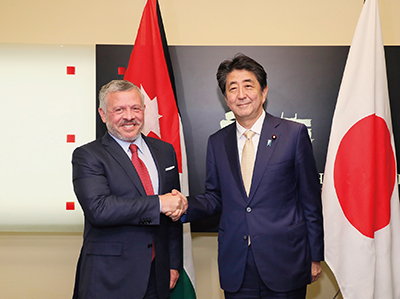 Japan-Jordan Summit Meeting (September 23, New York, U.S.; Photo: Cabinet Public Relations Office)
Japan-Jordan Summit Meeting (September 23, New York, U.S.; Photo: Cabinet Public Relations Office)Japan also attaches importance to Jordan, and in 2019, held the bilateral First Foreign Affairs and Security Consultation (Pol-Mil Dialogue), decided on a free loan to Jordan of a Type 61 MBT (Main Battle Tank) for exhibition, and progressed security cooperation. In addition, on the economic front, in May 2019 Japan contributed 100 million US dollars of the 300 million US dollar development policy loans that were signed during King Abdullah II's visit to Japan in November 2018.
Lebanon is a nation with a cultural and religious mosaic consisting of 18 religions and sects, including Christianity and Islam. In May 2018, elections for the Lebanese Parliament were held for the first time in nine years in a peaceful manner. Despite the required time due to difficulties in coordinating between religions, in January 2019 the third Hariri Cabinet was established.
However, large-scale anti-government demonstrations took place across Lebanon in October, triggered by opposition to the introduction of tax increases in the 2020 government budget. The demonstrators protested against the current sectarian political system and the eradication of corruption, and demanded early elections and the establishment of a “technocrat cabinet” that is not based on sectarianism. In response to this, Prime Minister Hariri announced his resignation, but the outlook for the situation in Lebanon was uncertain because of a lack of progress in coordination between religions over the state of the next cabinet. The absence of government seemed to have had a large impact on the Lebanese economy. It was hoped the next cabinet would be established soon. In this regard, when State Minister for Foreign Affairs Suzuki visited Lebanon in December 2019, he affirmed to government officials the importance of promoting dialogue with citizens.
Japan has also provided Lebanon with humanitarian aid for assistance to Syrian refugees and the host communities, and since 2012 has provided support of more than 210 million US dollars in total.
(6) Turkey
Turkey is a geopolitically important country in the region. As a member state of the North Atlantic Treaty Organization (NATO), Turkey plays a significant role in regional security while proactively pursuing multifaceted diplomacy with states in the Middle East, Asia, and Africa. Turkey has traditionally been one of the friendliest countries with Japan, as typified by episodes such as the Ertugrul Frigate3 incident in 1890.
After the presidential election in June 2018, Turkey moved from a parliamentary cabinet system to an executive presidential system in which entire executive authority belongs to the president. In the local elections held on March 31, 2019, the People's Alliance by the Justice and Development Party (AKP), which was the ruling party, and the Nationalist Movement Party (MHP) lost in six of the ten largest cities, including in Istanbul and Ankara. Following the AKP's appeal, the Istanbul's mayoral re-election was held on June 23, but the Imamoglu Republican People's Party (CHP, opposition) candidate won again with 54% of the vote.
Tensions in the U.S.-Turkey relationship increased for a time, with the U.S. imposing sanctions following Turkey's operation “Peace Spring” in Syria. An agreement was later reached between Turkey and the U.S., and between Turkey and Russia, ending military operations, and the U.S. lifted sanctions. However, discussions between the U.S. and Turkey continue over the introduction of Russian missile defense systems (S-400), which is a pending issue in bilateral relations. In addition to military operations in Syria, tensions with Western countries have continued over the repatriation of ISIL foreign combatants detained in Turkey to their home countries. On the other hand, Russia and Turkey, in addition to the situation in Syria, have established close relationships in the energy sector such as constructing gas pipelines and nuclear power plants. In Libya, which faces an unstable situation, Turkey has made moves such as the decision to dispatch troops to Libya. Turkey also concluded a Memorandum of Understanding (MOU) with the Government of National Accord of Libya concerning determination of the sea area in the Eastern Mediterranean. These decisions imply Turkey's interest in the natural gas fields of the Eastern Mediterranean.
In Turkey's relations with Japan, President Erdogan visited Japan to attend the G20 Osaka Summit, and a summit meeting was held in Tokyo in July. In October Minister of Culture and Tourism Ersoy attended the Ceremony of the Enthronement of His Majesty the Emperor, and in November the Japan-Turkey Foreign Ministers' Meeting was held on the margins of the G20 Aichi-Nagoya Foreign Ministers' Meeting. In addition, in December Special Advisor to the Prime Minister Kihara Minoru visited Turkey and met with governmental officials, including Chief Advisor to the President of the Republic of Turkey Cevik.
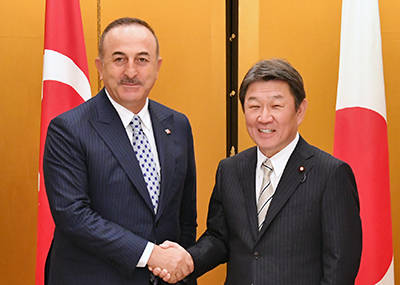 Japan-Turkey Foreign Ministers' Meeting (November 22, Nagoya)
Japan-Turkey Foreign Ministers' Meeting (November 22, Nagoya)- 3 For details for the Ertugrul Frigate incident, please refer to https://www.mofa.go.jp/mofaj/ms/da/page22_001052.html (only in the Japanese language)

(7) Middle East Peace Process
A Developments in the Middle East Peace Process
The Middle East Peace Process has stagnated since negotiations between Israel and Palestine faltered in April 2014. Israeli settlement activities in the West Bank continue, but due to the occurrence of periodic rocket attacks from the Gaza Strip, mutual mistrust has deepened and a return to talks has not been achieved.
Additionally, the U.S. Trump administration announced in December 2017 its position recognizing Jerusalem as the capital of Israel and moved the U.S. Embassy from Tel Aviv to Jerusalem in May, 2018. The Trump administration in August also decided to suspend all support to the United Nations Relief and Works Agency for Palestine Refugees (UNRWA). The Trump administration acknowledged Israeli sovereignty over the Golan Heights in March 2019, and in November Secretary of State Pompeo remarked that the establishment of Israeli settlements was not inconsistent with international law. The Palestinian side is strongly opposed to this series of U.S. policies.
In January 2020, the U.S. announced its vision for peace in the Middle East, and various discussions have been held in the international community; attention is being paid to future movements, including the resumption of dialogue between Israel and Palestine.
B The Government of Japan's Efforts
Japan, while working with the international community toward the achievement of a “two-state solution” that would enable Israel and Palestine to coexist in peace, has actively contributed through the three pillars of political dialogue with stakeholders, trust building among the parties, and financial support for Palestinians. As a unique Japanese initiative, Japan, setting the Jericho Agro-Industrial Park (JAIP) as a flagship project, has been promoting the “Corridor for Peace and Prosperity” initiative, which is a medium- and long-term contribution to facilitate Palestinian economic independence through regional cooperation with Japan, Palestine, Israel, and Jordan. As of the end of 2019, 15 private Palestinian companies are operating in the JAIP, which has created approximately 200 jobs.
In addition, Japan is mobilizing the resources and economic development knowledge of East Asian countries to support Palestinian nation building through the Conference on the Cooperation among East Asian countries for Palestinian Development (CEAPAD). The Third Senior Officials Meeting of the CEAPAD was held in Palestine in July. The conference serves as an opportunity for business meetings with Palestinian companies, and has also steadily achieved results, such as a signing ceremony for a memorandum of understanding on cooperation between the Indonesian Chamber of Commerce and the Palestinian Chamber of Commerce.
(8) Israel
Israel excels in the development of advanced technology and innovation and holds importance for the Japanese economy. It is also an important country in the stability of the Middle East region. In recent years, Israel has been expanding its relationship with Asian countries, including Japan, as a part of its efforts to diversify its diplomacy. As a result, the cooperative relations between Japan and Israel have been strengthened exponentially in the economic front. The number of businesses and the amount and number of investments from Japan to Israel are increasing. In addition, the Embassy of Japan in Israel established the Japan Innovation Center under its auspices, and is engaged in providing active support for developing relationships between Japanese and Israeli corporations.
General elections were held in Israel in April and September, but no agreement to form a government was reached, and another general election was held in March 2020. Despite this uncertainty about domestic politics, Japan and Israel are, based on Prime Minister Abe's visit to Israel in May 2018, promoting the construction of multi-faceted relations, including political and economic relations. Approximately 200 people from 100 Japanese companies accompanied Minister of Economy, Trade and Industry Seko Hiroshige's visit to Israel in January 2019. In September a Memorandum on Protection of Information for the Exchange of Classified Information on Defense Equipment and Technology between the Ministry of Defense of Japan and the Ministry of Defense of Israel was signed. In addition, direct charter flights between Narita and Tel Aviv were operated in September and December, and direct flights by El Al Israel Airlines are also planned to begin in 2020. The exchange of high-ranking officials between Japan and Israel has also continued to flourish, as in May when Israeli Attorney General Mandelblit visited Japan, while in August the official delegation of the Committee on Foreign Affairs of the House of Representatives and in December State Minister for Foreign Affairs Suzuki visited Israel.
(9) Palestine
Based on the Oslo Accords of 1993 and other agreements, the Palestinian Authority (PA) began self-government rule in the West Bank and Gaza Strip from 1995. Prime Minister Abbas assumed office as President after the presidential elections held in January 2005. After that, however, relations between the Fatah led by President Abbas and Hamas deteriorated, and Hamas seized control of the Gaza Strip by military force. Through Egypt's mediation efforts, Fatah and Hamas reached an agreement in-principle in October 2017 to transfer power in the Gaza Strip to the PA. However, the agreement has not been implemented and the division remains, with the West Bank still held by Fatah and the Gaza Strip remaining effectively under Hamas control.
In October 2019 Prime Minister Abe had a meeting with President Abbas, who visited Japan to attend the Ceremony of the Enthronement of His Majesty the Emperor, and President Abbas also had dinner with Foreign Minister Motegi. During these opportunities, they widely exchanged views on the issue of peace in the Middle East and discussed support for Palestine, including the “Corridor for Peace and Prosperity” initiative led by Japan.
In December State Minister for Foreign Affairs Suzuki visited Palestine and, in addition to meeting with President Abbas, Prime Minister Shtayyeh, Minister of Foreign Affairs and Expatriates Malki, he also visited the Jericho Agro-Industrial Park (JAIP) and received an explanation about the JAIP's current status from Minister of National Economy Osaili.
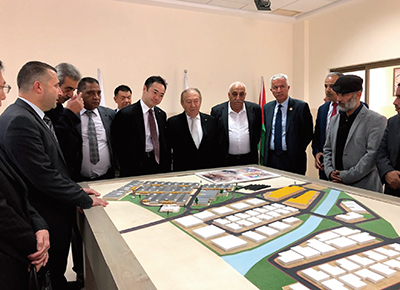 State Minister for Foreign Affairs Suzuki visits the Jericho Agro-Industrial Park (JAIP) (December 21, Palestine)
State Minister for Foreign Affairs Suzuki visits the Jericho Agro-Industrial Park (JAIP) (December 21, Palestine)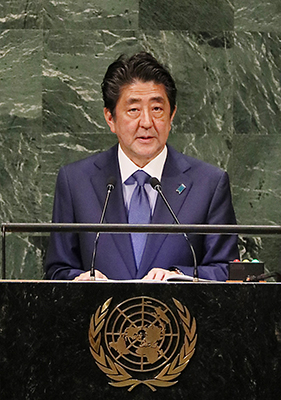 Prime Minister Abe announcing the invitational program for teachers from Gaza, at the UN General Assembly (September 2018, New York, U.S.; Photo: Cabinet Public Relations Office)
Prime Minister Abe announcing the invitational program for teachers from Gaza, at the UN General Assembly (September 2018, New York, U.S.; Photo: Cabinet Public Relations Office)“At the beginning of 2019, we will invite to Japan approximately ten elementary and junior high school teachers from the Gaza Strip. This will be the first such group and we will continue to invite teachers annually.”
This announcement was made by Prime Minister Abe at the UN General Assembly held in New York, the U.S., in September 2018. Palestine, in the Middle East, is not familiar to many of the Japanese people. What is happening in the Gaza Strip, and what has Japan begun to do?
Palestine consists of two areas separated by Israel which lies in between: the West Bank of the Jordan River, and the Gaza Strip that is adjacent to the Sinai Peninsula of Egypt. In addition to the ongoing conflict between Israel and the Palestinian sides since 1948, the region has also been affected by internal rivalry between Palestinian factions since 2007. As a result, the Gaza Strip has suffered from an enclosed environment for more than ten years, and its humanitarian and economic conditions continue to deteriorate. Amidst the unstable situation with unemployment rate exceeding 40%, the situation surrounding the people of Gaza has become intolerable, especially with regard to the sense of hopelessness among youths in the region.
The international community, including Japan, has to address the crisis that is present “right there and now” through food assistance and other forms of support. At the same time, however, from the medium- to long-term perspective, Palestine faces the pressing challenge of creating a sound educational environment so that the youths who bear the future of Palestine on their shoulders do not lose their hope for the future and their dignity as individuals.
Half a year after Prime Minister Abe's address at the UN General Assembly, ten teachers from the Gaza Strip arrived at Narita International Airport on March 2, 2019. During their stay lasting about a week, they were lectured by the Ministry of Education, Culture, Sports, Science and Technology and the Ministry of Health, Labour and Welfare about Japan's educational system and human resource development, visited the Tokyo Metropolitan School Personnel in Service Training Center and other sites, and deepened their knowledge about education in Japan. In Hiroshima, they visited Noboricho Elementary School, which is putting an emphasis on peace education. In addition to experiencing how education for peace is implemented in practice, the teachers also deepened their interaction with the children, such as by observing the serving of school meals.
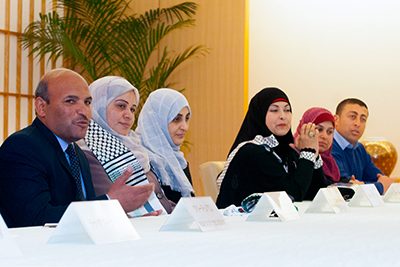 The visiting teachers paying a courtesy call on the Foreign Minister (March 2019, Tokyo)
The visiting teachers paying a courtesy call on the Foreign Minister (March 2019, Tokyo)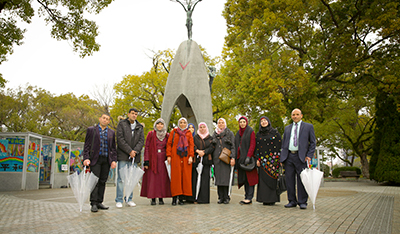 The teachers visiting the Hiroshima Peace Memorial Park (March 2019, Hiroshima)
The teachers visiting the Hiroshima Peace Memorial Park (March 2019, Hiroshima)In his address at the UN General Assembly, Prime Minister Abe stated that, “Once 20 years pass, there will be 200 teachers who will have experienced visiting Japan. The number of students taught by them will number in the thousands.” By continuing this invitation program for teachers from the Gaza Strip, the “Japan” that these teachers learn about during their stay is expected to spread gradually across the Gaza Strip. For the children of Gaza, this will definitely become an inspiration for the world outside they have yet to see, as well as their hope for the future. These children will also become the foundation for a solid relationship between Japan and Palestine in the future.
MOFA will continue to provide assistance and support to Palestine through various projects, including inviting teachers from the Gaza Strip to Japan.
(10) Afghanistan
Afghanistan is a multi-ethnic state located between Central Asia, South Asia, and the Middle East. In the country, the severe security situation continues, with the Afghan government troops conducting cleanup operations against active attacks by the anti-government Taliban and ISIL-related organizations, and realizing peace with the Taliban is one of the focal points.
Against this backdrop, the Afghanistan Government held a national great assembly (Loya Jirga), and there were efforts toward peace, such as the “Intra-Afghan Dialogue” in Moscow (Russia) and Doha (Qatar). In addition, although direct peace talks between the U.S. (Special Representative Khalilzad) and the Taliban, which begun in the fall of 2018, were suspended in September 2019 at the direction of President Trump, resumption of this effort was announced by President Trump, who visited Afghanistan for the first time in November.
On September 28, Afghanistan held the presidential election, which takes place once every five years. The current President Ghani and Chief Executive Abdullah were candidates in the election, and, after some confusion over the vote counting, on December 22, a preliminary result showed that President Ghani had won with 50.6% of the vote.
Japan is one of the major donors to Afghanistan, and in 2019 Japan continues to provide development assistance in areas such as health, education, agriculture, and human resources development, as well as support for the Afghan police, and a variety of other support so that Afghanistan can become truly independent. The United Nations Assistance Mission in Afghanistan (UNAMA), which is represented by Special Representative of the Secretary-General Yamamoto Tadamichi, plays an active role in supporting the peace process, in political fields including elections, and in humanitarian and developmental fields including coordination among donors.
In May the Japan-Afghanistan Foreign Ministers' Meeting was held in Tajikistan for the first time in seven years. In addition, President Ghani visited Japan on the occasion of the Ceremony of the Enthronement of His Majesty the Emperor in October, and a Japan-Afghanistan Summit Meeting was held for the first time in seven years, too. 2019 was a year in which bilateral relations between Japan and Afghanistan expanded even further, but on the other hand, it was also a year that saw the loss of two Japanese individuals who made great achievements internationally in supporting Afghanistan: Mrs. Ogata Sadako, who served as Special Representative of the Government of Japan on Reconstruction Assistance to Afghanistan and as President of the Japan International Cooperation Agency (JICA), and Dr. Nakamura Testu, the local representative of the Peshawar-kai, who made efforts in the medical field and in irrigation projects.
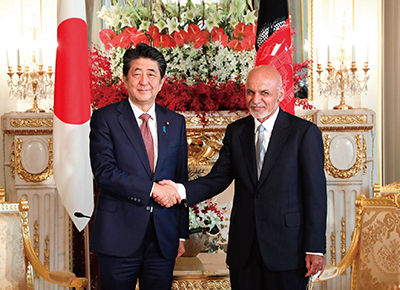 Japan-Afghanistan Summit Meeting
Japan-Afghanistan Summit Meeting (October 23, Tokyo; Photo: Cabinet Public Relations Office)
(11) Egypt
Located at the north-eastern edge of the African continent and facing Europe on the other side of the Mediterranean, Egypt is a major country in the region, and plays an important role in the stability of the Middle East and North Africa.
Egypt's domestic affairs are generally stable. In June 2018 the El-Sisi administration entered its second term, and the constitutional referendum in April 2019 made it possible for President El-Sisi to remain in office until 2030. On the economic front, there has been a significant improvement in macroeconomic indicators such as GDP growth and foreign exchange reserves by introducing a floating exchange rate system in autumn 2016 and decreasing the fuel subsidy system, as well as the introduction of value-added tax. In addition, for three years since 2016, Egypt has been the largest destination in Africa of the foreign direct investment.
Steady progress has been seen in the Japan-Egypt relations since President El-Sisi's visit to Japan in February 2016. Cooperation covers various areas such as the construction program of the Grand Egyptian Museum and the “Egypt-Japan Education Partnership (EJEP),” which includes the introduction of Japanese-style education, an increase in the numbers of Egyptian students and trainees to Japan, and strengthening support for the Egypt-Japan University of Science and Technology (E-JUST). In addition, since April 2019, two Self-Defense Force personnel have been dispatched to the Multinational Force and Observers (MFO) stationed on the Sinai Peninsula.
In 2019 Egypt chaired the African Union (AU) and invigorated diplomacy with Africa. In addition, the G20 Presidency was held by Japan and many Egyptian dignitaries visited Japan to attend relevant conferences. In June, relevant officials such as President El-Sisi and Minister of Foreign Affairs Shoukry visited Japan and attended the G20 Osaka Summit, and in August President El-Sisi and Minister of Foreign Affairs Shoukry visited Japan and attended the Seventh Tokyo International Conference on African Development (TICAD7). In addition, Minister of Antiquities El-Anany was in attendance for the Ceremony of the Enthronement of His Majesty the Emperor. From Japan, there were visits to Egypt in February by Parliamentary Vice-Minister for Foreign Affairs Sonoura Kentaro, in March by Parliamentary Vice-Minister of Defense Suzuki Takako, in August by State Minister of Cabinet Sato Akira, in September by Parliamentary Vice-Minister of Economy, Trade and Industry Isozaki Yoshihiko, and in December by Parliamentary Vice-Minister for Foreign Affairs Nakatani Shinichi.
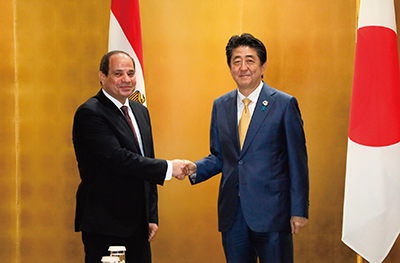 Japan-Egypt Summit Meeting
Japan-Egypt Summit Meeting (June 27, Osaka; Photo: Cabinet Public Relations Office)
Regarding bilateral business relations, a Japanese business mission (40 companies) visited Egypt in March, and, in addition, the Japan-Arab Economic Forum was held in September. It is expected that there will be increases in bilateral investment and exchange of people in the future. The number of tourists from Japan to Egypt has also been increasing in recent years.



